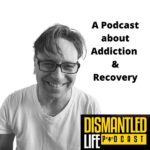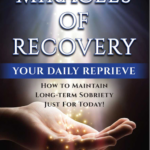We all know the far-reaching implications of COVID differ for many of us. For those, however, with an alcohol use disorder, (AUD) the impact on individuals and their families can be affected in ways not considered previously.
 Plenty of folks new to AUD (alcoholism) experience an even deeper isolation than that of COVID: personality changes, avoidance and lies”‘”‘”‘these are but a few of the milder complications of symptoms that point to the severity of what’s affecting us than a few drinks.
Plenty of folks new to AUD (alcoholism) experience an even deeper isolation than that of COVID: personality changes, avoidance and lies”‘”‘”‘these are but a few of the milder complications of symptoms that point to the severity of what’s affecting us than a few drinks.
On March 22, 2022, Matt Stieb published an article in New York Magazine stating that alcohol killed more people under-65 than COVID in 2020.
In a new study by the National Institute of Alcohol Abuse and Alcoholism, researchers sifted through death certificates to find that alcohol was the underlying, contributing cause of death. Here, 74,408 vs. the 74,075 deaths from COVID were attributed to alcohol related factors.
INEVITABLE SYMPTOMS OF ALCOHOL USE DISORDER:
It is inevitable that sooner or later we will begin to experience several or all of the following symptoms:
Trouble breathing, Impaired Judgment, Headaches, Blackouts, Distorted vision and hearing, Slow reflexes, Words mismatched, slurred
These long-term effects are considered dangerous: that may cause irreversible damage leading to death:
Depression, Permanent brain damage, Psoriasis, Anxiety disorders, Neurological impairment, Cirrhosis of the Liver, Irrevocable brain damage, Chronic pancreatitis, Hand Tremors, Compromised Immune System, High Blood Pressure, Sexual problems, Nerve damage, Vitamin B1 deficiency, Malnutrition, Gastritis, Alcohol Poisoning, Cancers of the mouth, throat, liver and more.
Other non-medical side-effects of AUD might be:
Legal Issues, Mental Health issues, Disruption with relationships in family, work friends; Needing alcohol to function; Making excuses/lies to allow for drinking; The giving-up of social, professional or recreational activities because of the need to drink; Isolation; Cravings or obsessive thoughts; Poor memory.
ALCOHOLISM SYMPTOMS: PROGRESSION AND WARNING SIGNS – MY STORY
I remember going to a doctor at age 19 because of drinking in my late teens. I walked into a lounge with friends, already drunk with a couple more under my belt. Within the first hour there, I blacked out and fell over a few chairs breaking my ribs. When the doctor asked what happened, and “how much did I drink?” I remember stating, “just a couple, was all,” my excuse being that I had slept very little the night before and didn’t eat dinner. At the time, my friends laughed thinking “you really did it this time,” when in reality, it was never just about, “this time.”
A typical night out on the town of drinking one or two drinks soon showed that I was from the beginning, a black-out drinker. In my case, losing thirty or so years of my life to alcohol. I could not recall the end result of my nightly escapades: who I was with, where I had ended up, or how I made it home on a particular night. I was a chronic alcoholic who had, from the very beginning, drank to drown the noise in my head that reminded with each move what a loser I was. There were a couple of times in particular when I believe I had died, but although passed out, I came back.
Toward the middle of my drinking career, I began to isolate, making excuses to everyone why I needed to stay close to home. Of course, work was part of my façade, only to come home, calculating on the way, how much booze was there, how much more I needed for the night, the next day and always the weekend. The more isolated I became the sicker I became because when I think”‘”‘”‘I drink!
Now, imagine those families who suffered from COVID, lost their jobs, confined to their homes. Now imagine those member or members with alcoholic tendencies. The hopelessness and high-anxiety brought by COVID, coupled with financial and job worries would be more than enough to send a weekly problem drinker into chronic alcoholism.
One of the main problems with long-term, chronic abuse, regardless of the amount one drinks, is that we don’t “see” it.
We have no idea the degree of damage being done to our brain and physical bodies.
We have a disease of perception; the brain tells us, “this is just what I needed” and we drink more, as the mental obsession called the phenomenon of craving begins to change our thinking and behaviors. Many of us experience the mental obsession with alcohol long before we picked up the first drink.. For those of us unsure as to whether we have a drinking problem or not, this should be our first clue. The obsession tells us that “just one drink will do it,” and then the physical part of our disease confirms to the brain, “naw, I have to have just one more,”
This is the setup for more—and we cannot stop. Internally, our livers, heart and central systems try to keep up with the assault of the poison of alcohol and its components, but it cannot. The insidiousness of AUD can not be understated: Not unlike a cancer left undetected, we know that while abstinence prevents it from exploding, our disease keeps moves forward. Whether we drink or not, If we pick up—most report the disease of AUD was much worse, as stopping becomes for many, a dangerous death wish where plenty of us never return from.
As more information becomes available, medical and mental health professions are slowly beginning to understand that regular and consistent drinking leads to three very distinct conclusions: prison, institutions and/or death. The advent of COVID is the unfortunate but timely prompt some professionals needed to redefine alcoholism and implement new parameters that include mental health components.
The stigma and denial of the chronic drinker, fueled by lack of information, must be reduced or removed sufficient for them to understand their life depends upon finding some form of permanent treatment. Many of us find that Alcoholics Anonymous is enough. For others, it may be in-house rehabilitations at a Treatment Center complete with medical, spiritual, and mental health programs in a group setting with others just like them.
Regardless for the method chosen to detox, professional consult and care should be sought prior to the chronic drinker stopping. Stopping abruptly has the power to kill and should be done only with medical supervision.
For the chronic alcoholic reading this article, it is imperative that you understand there is no controlling this disease whatsoever. Alcohol, at its best, is an inside job.
We all thought we could determine that magic number of drinks needed to “get us there,” and it very well may work”‘”‘for a short length of time.
And that’s where this story ends… With the knowledge that hundreds of thousands of men and women have died before you trying to no avail, to out-smart, out-know or out-think alcoholism, the outcome was always the same. They died for us, finding out first hand that one way to have it permanently arrested, and ensure that you live, is through one hundred percent abstinence.
NO EXCEPTIONS
This disease makes NO exceptions. AUD has no regard for people’s lives other than what the ego can prove. The mental/emotional aspect of this disease is motivated by ego, by pride, by lack of self-validation and self-esteem. Our brain recites lies that, “we have no drinking problem at all!” even though our physical situation points otherwise. That we are in charge of how much we can drink and these lies persist and haunt us today as those chronic drinkers lie on their death beds.
It’s main focus, its only purpose is to ravage an otherwise sound mind and body. And it does just that, with the first drink. If you are a chronic drinker, it’s the first drink that gets us drunk (because for us, there never just one drink.)
Featuring 365-daily inspirations. Miracles of Recovery was written not just for those addicted, but for the parents, the spouses – anyone touched by the disease, because addiction is absolutely a family affair. Using the foundation of 12-Step Recovery, Miracles of Recovery embraces holistic suggestions as a practical approach to facing life on life’s terms, clean and sober. Encouraging and thought-provoking, Miracles of Recovery inspires with Universal Truths, “Because,” Harriet says, “once we know better, we do better.”
Substance abuse issues have been on the increase, primarily due to the overwhelming effects of a global pandemic. The National Institute of Alcohol and Alcohol Abuse mentioned in 2018 that 88,000 people die each year to alcohol-related deaths. They go on to say that globally, alcohol misuse was the fifth leading risk factor for premature death and disability in 2010. Now these statistics look even more dire with the onslaught of the Pandemic effect: premature death, isolation, job loss and so much more.
While there are many treatment approaches and programs, what is common to successful individuals who find themselves within a substance abuse program is the shared pain and the loneliness, often with an ongoing support system for the person battling the disease. That support system is what Harriet Hunter offers in “Miracles of Recovery: Daily Meditations of Hope, Courage and Faith.”
Miracles of Recovery shows through personal examples how to achieve long-term sobriety by embracing new behavior and positive reinforcement, regardless of what happens in one’s life. She offers a personal, sometimes raw reflection of the truth about addiction seldom seen elsewhere.
Tools necessary to maintain sobriety and change one’s life through changing one’s perspective are also proposed. Miracles of Recovery suggests that readers “Do life differently,” through exercises, solutions, and methods to improve self-esteem, confidence, and embrace a profound sense of hope needed to succeed. The author spurs the reader to embrace the belief that, regardless of challenges life presents, “NOTHING can change the course of recovery when you keep yourself, your sobriety, and your Higher Power first in your life.” In short, Miracles of Recovery offers hope where there is none through simple 12 STEPS of AA and personal actions for complicated people.
Hunter has received rave reviews for her work from readers and reviewers alike. Vernita Taylor of Readers Favorite stated, “Miracles of Recovery: Daily Meditations of Hope, Courage, and Faith by Harriet Hunter is a great choice if you’re struggling with addiction because it offers a full year of inspiration and affirmations which I enjoyed. I see this book as a mentor or sponsor that is walking by your side and helping to lead you to a better, more improved you while teaching you how to deal with your stressors. The best teacher is someone who has been there and done that, and this book doesn’t disappoint. The author knows first-hand what it takes and how it feels to be addicted. If you need help along your journey, pick up a copy of this book; it’s highly recommended.”
Anthony Capozzoli of Dismantled Life Podcast said, “Miracles of Recovery has been a feast for my recovering soul. Every page is filled with love and helpful insights that lead to discovery. I read each page by date and randomly turn to other pages for an additional spiritual hug when I need one. It’s almost as if Harriet wrote her wonderful book for me. Page after page hits so close to home I often tear up from positive awareness and clarity of emotion.”
“Miracles of Recovery has been a feast for my recovering soul. Every page is filled with love and helpful insights that lead to discovery. I read each page by date and randomly turn to other pages for an additional spiritual hug when I need one. It’s almost as if Harriet wrote her wonderful book for me. Page after page hits so close to home I often tear up from positive awareness and clarity of emotion.”
Miracles of Recovery received the first place President’s Award in nonfiction from the Florida Authors and Publishers Association.
Since her walk into recovery in 1999, Harriet has had one primary purpose: to show others how they can achieve their miracles while staying sober with a vision and determination to never go backwards, one day at a time.
With each purchase of a personalized autograph copy of Miracles of Recovery from her website, Hunter provides a no-charge copy of her e-book, “Your Daily Reprieve; How to Maintain Long-Term Sobriety Serenely Just for Today” in PDF format
Harriet Hunter is available for media interviews and speaking engagements and can be contacted using the information below or by email at serenelywritten@yahoo.com. More information, including the journaling course, no-charge audios, e-books, handouts and other gifts can be found by visiting https://www.harriethunter.org.
About Harriet Hunter:
With over 22 years of sobriety, Harriet has worked with hundreds of women who suffer with alcoholism and drug addiction to help them find recovery while in active sobriety, and sponsors women both face-to-face and online. Readers can find her in the global recovery site, Intherooms.com, where she’s been given her own room and brings Miracles to life each Sunday at 2:00 P.M. EST.
Contact:

